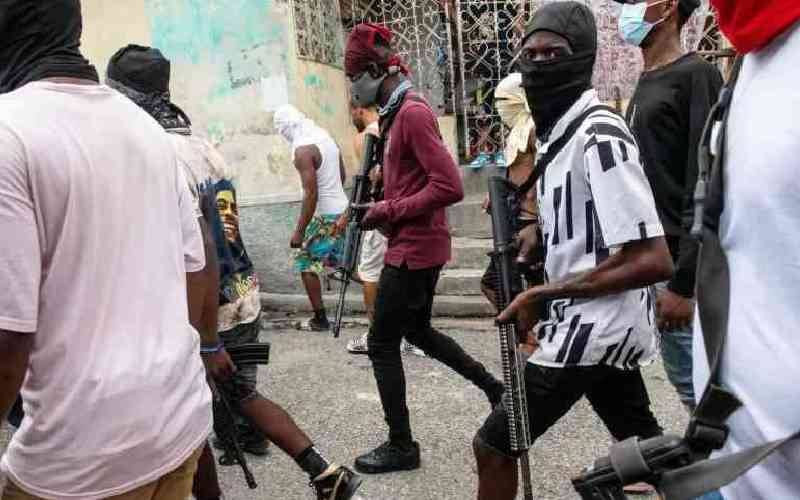We find over ten people carrying torches surrounding a shallow water well in Kiangwe village, Basuba location, Lamu County at 11 am and the first question we ask is why they have torches at day time?. This comes out automatically in a place where insecurity has been rearing its ugly head for some time. The answer we get surprises us even as it makes all of us sad. These community members have spent their night next to the only well with some water hoping to get even five liters to go use back home. They tell us that they walked for over two hours to reach here in search of this elusive yet important resource.
It’s a group of men and women who after traveling for over two hours spent the night next to the water well and by 11 am, the water that is dripping in the well can’t even fill two cups and yet there are over ten 20 liter water containers waiting in line. The determination on their faces tells a whole story for this is a community facing all kinds of odds ranging from insecurity, drought, illiteracy and now this scarcity of water. They tell us that they had their last meal over 24 hours ago but can’t go back to the village without water for what will they use to prepare their food, what will they use to drink? How will they even take a bath?
Some of them tell us that even the wild animals are not spared and we are shown banana stems that have been ostensibly attacked by wild animals looking for fluids from the stem now that there is no water anywhere. The community members used to go look for natural wells in the forest in the past during such calamities but now that is not possible because due to insecurity their movements have been curtailed and they have to survive around the village with limited resources including the elusive water resource.
One of the team members ask whether they have informed the county government about their situation and we are told that while the county government have water boozers, the closest they have come is Basuba village which is over 6 hours away from Kiangwe. Somebody else asks why the boozer didn’t reach here and everybody goes quite before saying that while they don’t have the right answer, they hear it’s because the driver feared insecurity and therefore reached Basuba and went back.
Somebody else asks whether the community leaders like the Member of County Assembly (MCA) knows about this situation and whether they have responded and again there is silence before one of the community members say that most of the leaders ostensibly due to insecurity haven’t come to the village for over two years and literally they are on their own.
One person shouts that while the rest of the county is celebrating the culture festival in Lamu Island, they have been left on their own and don’t even have water to drink.
We cast our eyes to where we came from and see the mass of water in the sea and compare with the situation where community members don’t have water and we feel sad. How could it be that people who live next to the sea don’t have access to water? Somebody will say the water is salty but haven’t we heard of technology? The technology to desalinate the salty water and help this community have freshwater? How many people elsewhere would want to trade places with the Kiangwe community and be next to water mass? How many responsible leaders would be falling over themselves to invest in technology to help address the plight of this marginalized community?
How much can one marginalized community take? They don’t have titles to their land, their schools were closed due to insecurity, all the teachers ran away, they can’t move into the forest to go look for herbs and food due to insecurity, they can’t harvest their honey in the forest again because of insecurity, the only dispensary they had in Mangai was destroyed by Al-Shabaab, the young men are moving in droves going to the nearby towns in search of income leaving the old folk behind and the drought is taking its toll!
In this mix, you add water scarcity and the fact that family members are literally spending nights next to water wells hoping that they can get some for home use and you realize that as one person once said ‘things are elephant’.
One of things you can’t fault this community for is the fact that in spite of all these odds their resilience is up there and they tell the team that we can go ahead and strengthen their capacity on the drought resistant crops because as one of them says, their people who will survive this drought will need food and life has to go on.
We finish our mission, jump into the boat troubled with what we have seen and promise to do what we can to make sure that the county and national governments are informed of this plight only for our mood to be saddened when we reach Lamu and watching news we hear some ‘suspects’ bragging of how they used to ‘catwalk ’ with baskets and baskets of money from one place to another like groundnuts paying imaginary characters and wonder what did people like Awer do wrong that while they are struggling to get even a drop of water, some others are cat walking on one corner with money that would have come in handy in addressing the plight of people such as the Awer.
 The Standard Group Plc is a
multi-media organization with investments in media platforms spanning newspaper
print operations, television, radio broadcasting, digital and online services. The
Standard Group is recognized as a leading multi-media house in Kenya with a key
influence in matters of national and international interest.
The Standard Group Plc is a
multi-media organization with investments in media platforms spanning newspaper
print operations, television, radio broadcasting, digital and online services. The
Standard Group is recognized as a leading multi-media house in Kenya with a key
influence in matters of national and international interest.
 The Standard Group Plc is a
multi-media organization with investments in media platforms spanning newspaper
print operations, television, radio broadcasting, digital and online services. The
Standard Group is recognized as a leading multi-media house in Kenya with a key
influence in matters of national and international interest.
The Standard Group Plc is a
multi-media organization with investments in media platforms spanning newspaper
print operations, television, radio broadcasting, digital and online services. The
Standard Group is recognized as a leading multi-media house in Kenya with a key
influence in matters of national and international interest.







